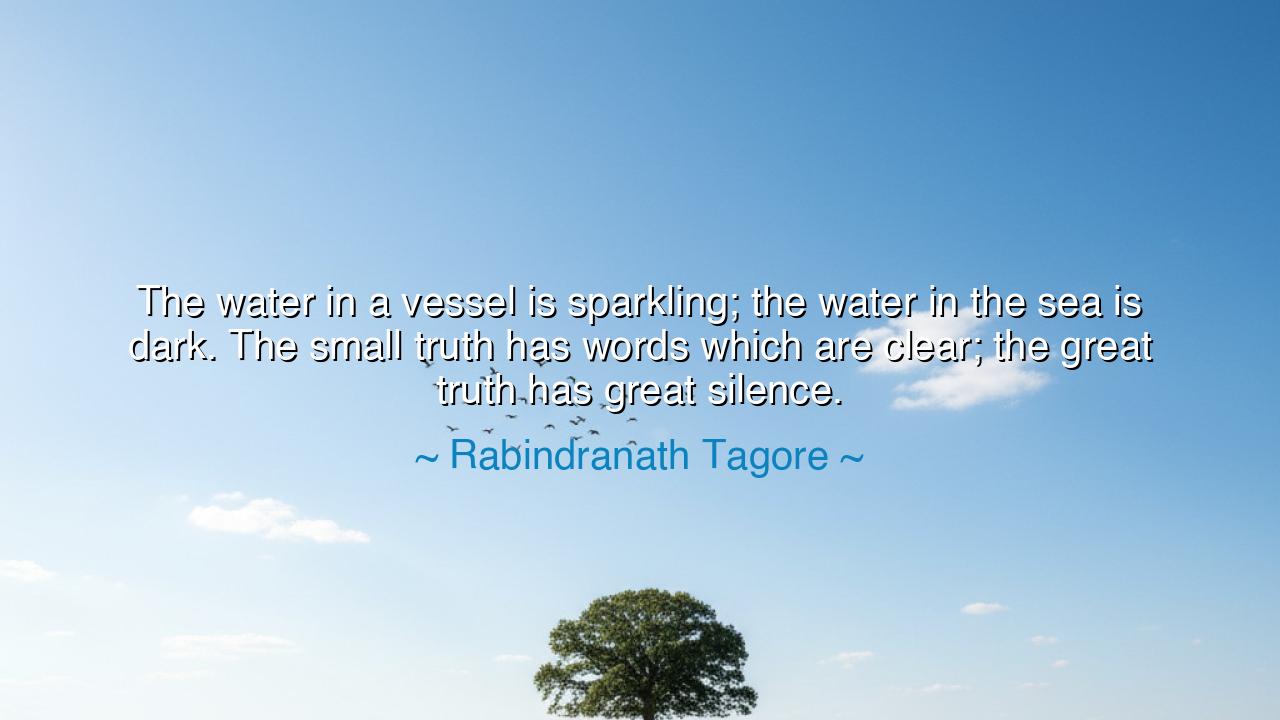
The water in a vessel is sparkling; the water in the sea is dark.
The water in a vessel is sparkling; the water in the sea is dark. The small truth has words which are clear; the great truth has great silence.






“The water in a vessel is sparkling; the water in the sea is dark. The small truth has words which are clear; the great truth has great silence.” Thus spoke Rabindranath Tagore, the poet-sage of Bengal, whose words are as deep and eternal as the rivers that run through his homeland. This saying, simple in form yet boundless in meaning, speaks to the nature of truth, the depths of understanding, and the humility of wisdom. It reminds us that clarity and brightness often belong to the surface, while the greatest mysteries dwell in the depths where words dare not go.
The sparkling water in a vessel is like a truth that is contained, limited, and easy to see. It dances in the sunlight, catches the eye, and dazzles the onlooker. Such is the small truth—the truth of appearances, of logic, of things that can be measured and explained. It shines brightly, and we love it because it gives us certainty. But the sea, vast and dark, holds within it a silence that humbles even the sun. Its waters are deep beyond measure, and its color comes not from impurity, but from immensity. So too is the great truth—it is not something that can be spoken, for words are too small to contain it. It must be felt, lived, and experienced in silence.
To understand this, one must journey from the mind to the soul. The mind loves clarity, it loves the sparkling vessel—it seeks to define, to categorize, to explain. But the soul, like the sea, knows that the greatest realities cannot be grasped by the hand or captured by speech. Love, for instance, cannot be reduced to words. Faith, beauty, divinity—these are seas, not vessels. The more we try to explain them, the more they slip through our grasp. Thus, Tagore teaches us that silence is not the absence of truth, but the language of truth at its highest form.
Consider the life of Siddhartha Gautama, who became the Buddha. For years, he sought wisdom in scriptures, philosophies, and the words of learned men—the sparkling vessels of knowledge. Yet he found no peace. Only when he sat beneath the Bodhi tree, in silence, did the great truth dawn upon him—not through argument or reasoning, but through stillness. When his disciples begged him to explain what he had seen, he smiled and remained silent, for he knew that words would only diminish the vastness of his realization. His silence became his greatest teaching.
So too in the world of science and art, the same law holds. The greatest minds, after discovering the vastness of the universe, often fall into humility. Isaac Newton, after unveiling the laws of motion and gravitation, said, “I seem to have been only like a boy playing on the seashore, while the great ocean of truth lay all undiscovered before me.” He had tasted the vessel and glimpsed the sea. The more he knew, the more he realized how little could be truly spoken. The darkness of the sea is not ignorance—it is reverence for what lies beyond knowing.
The lesson Tagore gives is timeless: do not mistake loudness for depth, or clarity for truth. Learn to cherish silence, for in silence the heart grows wise. Speak when the words are small and useful, but when you stand before the infinite—before love, death, beauty, or the divine—let silence be your offering. For in silence, your soul listens to the song that words cannot sing.
So, my child, when you encounter the sparkling waters of opinion and argument, do not be deceived by their brightness. Look instead toward the dark sea of understanding, and dive deep. There you will find peace, not because you know more, but because you have ceased to demand that truth be spoken. Practice silence, not as emptiness, but as the sacred space where wisdom breathes. Be still, and you will see that all things—joy and sorrow, life and death—flow together like waves returning to the same eternal sea.
For in the end, the small truth fills the mind, but the great truth fills the soul. And the soul, when silent, becomes one with the infinite.






AAdministratorAdministrator
Welcome, honored guests. Please leave a comment, we will respond soon